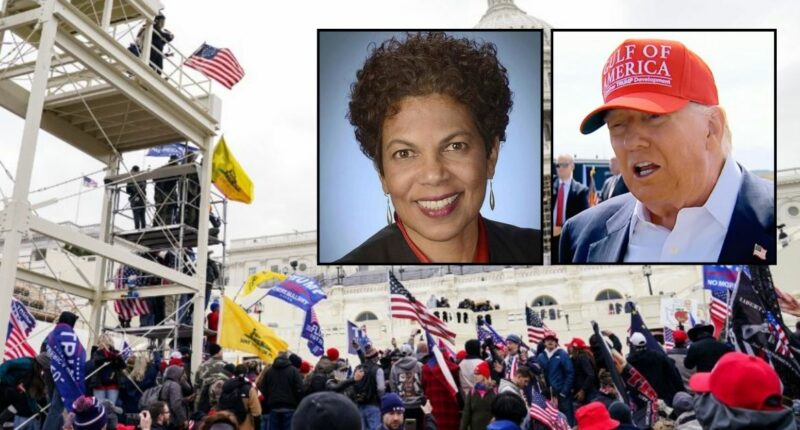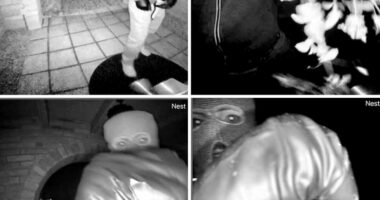Share this @internewscast.com
Left inset: U.S. District Judge Tanya Chutkan (Administrative Office of the U.S. Courts via AP). Right inset: President Donald Trump addressing the press at Dade-Collier Training and Transition Airport in Ochopee, Fla., during his visit to the new immigration detention center, known as “Alligator Alcatraz,” on Tuesday, July 9, 2025 (WTTG/YouTube). Background: Supporters of President Donald Trump forcefully enter the U.S. Capitol in Washington, January 6, 2021 (AP Photo/John Minchillo).
A fourth federal judge has agreed with their peers in rejecting requests from Jan. 6 defendants for reimbursements of restitution after receiving pardons from President Donald Trump. The latest denial was given to a Texas participant in the Capitol riot, who had openly shared his involvement in the 2021 incident on Facebook by uploading photos and videos of his unlawful entry, according to the Justice Department.
Recently, U.S. District Judge Tanya Chutkan refused a request for the return of restitution and fines to Stacy Hager, 61. Hager, convicted in 2023 on four minor charges associated with the Capitol riots, had sought the return of the $570 he was obligated to pay, having appealed for it this past February.
Federal prosecutors signed off on Hager”s request, as they have with other Jan. 6 defendants, and said there was “no longer any basis justifying the government’s retaining funds.” Chutkan was not convinced, citing three other rejections that have been dished out in recent weeks, all in her district in Washington, D.C.
“At least three other judges in this district have denied similar motions where defendants sought reimbursement for fines and fees associated with their now pardoned criminal convictions,” the Barack appointee wrote in her three-page order, which she issued last Thursday.
“The government concurs, acknowledging that pardons generally do not ‘make amends for the past’ nor do they afford any ‘relief for what has been suffered by the offender,'” Chutkan said. “But it takes the curious position that in this ‘unusual situation,’ reimbursement is appropriate.”
Love true crime? Sign up for our newsletter, The Law&Crime Docket, to get the latest real-life crime stories delivered right to your inbox.
Chief U.S. District Judge James Boasberg, U.S. District Judge Royce Lamberth and U.S. District Judge Randolph Moss are the other District of Columbia judges who have turned down requests from Jan. 6 defendants in recent weeks.
Boasberg rebuffed a request from a Maryland couple on June 30 who asked for roughly $1,000 in restitution to be returned to them; Moss said no to a pardoned former U.S. Marine from New Jersey; Lamberth denied Utah defendant John Sullivan.
Chutkan echoed their reasoning in her order last week, citing the U.S. Supreme Court 1877 decision in Knote v. United States, which described a pardon as “an act of grace” that does not restore “rights or property once vested in others in consequence of the conviction and judgment.”
“A pardon cannot authorize reimbursement once money has ‘been paid to a party to whom the law has assigned them,’ because the party’s ‘rights . . . have become vested, and are as complete as if they were acquired in any other legal way,'” Chutkan said.
Trump’s mass pardon of Jan. 6 rioters recognized Hager as one of more than 1,500 defendants who have been granted clemency since the president took office for a second time in January.
The DOJ tried claiming that what made Hager’s situation unique — as well as others who had similar convictions like his “invalidated” — is that he was “not just pardoned” but instead told that the government was flat-out vacating his case while it was still on appeal.
“Here, Hager’s conviction was ‘invalidated’ when the D.C. Circuit vacated it, and thus ‘there is no longer any basis justifying the government’s retaining funds exacted only as a result of that conviction,'” wrote Assistant U.S. Attorney Adam Dreher in response to the motion filed by Hager on Feb. 28 for reimbursement of fines, fees and restitution.
“In Knote, the Supreme Court made clear that ‘a pardoned individual is not ‘entitle[d]’ to payments that have already been deposited into the United States Treasury, absent congressional authorization to withdraw the funds,'” Chutkan concluded. “Therefore, this court lacks the authority to order the Architect of the Capitol to refund Hager’s $570.”
Hager’s lawyers did not respond to Law&Crime’s requests for comment Tuesday.
















